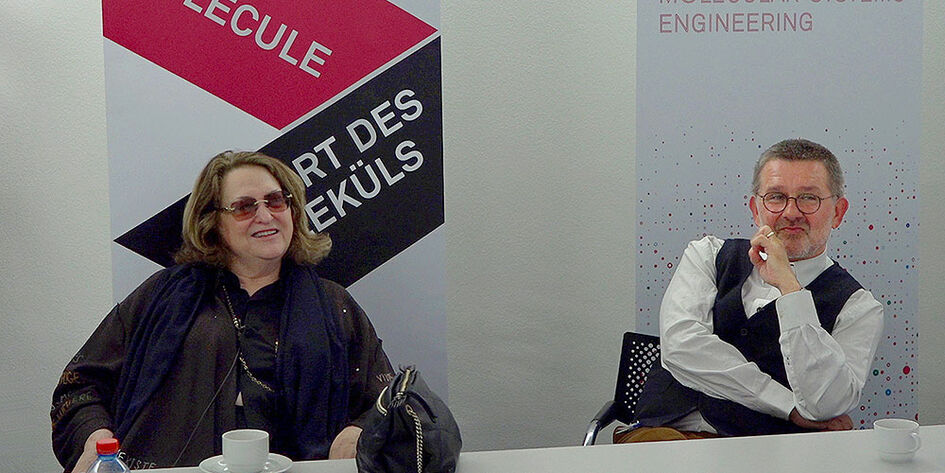
American media artist and filmmaker Lynn Hershman Leeson has long studied the relationship between technological innovation and human identity. As part of her latest project, on 27.10.2017 she visited the NCCR MSE.
Under the title "Anti-bodies", Hershman Leeson will present her latest works during Art Basel 2018 at the Haus der elektronische Kunst Basel. During her stay in Basel, the 76-year-old artist also visited the NCCR MSE. In addition to lab visits, the program included a discussion and exchange with chemists, biologists and physicists about the contents and research objectives of the NCCR. Above all, the role of art as a link and bridge between the sciences and the public was discussed.
During the discussion, Hershman Leeson explained her planned exhibition in Basel. Six rooms will feature works on molecular biology in the form of films, photographs and installations, including a video showing an interview with molecular biologist Georg Church. Her ultimate goal is to merge art and science. In her opinion, the two disciplines do not contradict each other, quite the opposite. No wonder, then, that Hershman Leeson's work is repeatedly discussed in scientific publications.
The artist is convinced that art must build a bridge between science and the audience. "Access to scientific topics should also take place via art. Not just in exhibitions or museums, but everywhere, where the population spends their free time." This is also the way she understands the meaning of her own work, said Hershman.
"Can computers be creative someday?" asked a PhD student, and her answer was: "They are already today! Robots have already been programmed that can paint pictures." At once, the objection was raised that the robots were specially built and programmed to paint. "But in the meantime, systems with artificial intelligence have developed their own languages that we no longer understand." The reports of this phenomenon were not received with enthusiasm by the public at large.
But Hershman Leeson does not think much of horror scenarios. As an artist who has dedicated her life's work on science and its impact on human identity, she sees no reason to panic about logarithms. In an earlier interview she also said "that we should make friends with the digital identities".
The topic of responsibility of science and art towards society was also discussed. Everybody agreed that the task of art was to draw attention to the problems of the world. Hershman Leeson saw a great challenge for science, however, which has the responsibility to stop the destruction of the earth: "Solutions must be found to preserve the planet." She was also asked whether US universities financially support artistic work about science: "No. There is nothing, no cent and no other support. But there is always a way for an artist."
The visit of Hershman Leeson took place at the invitation of the "Art of Molecule" ethics project at NCCR MSE. As part of the project, artists of all genres are regularly invited to participate in the discourse on the goals and ethical challenges of molecular systems engineering.
American media artist and filmmaker Lynn Hershman Leeson has been exploring the relationship between technological innovation and human identity for more than four decades. Her portfolio shows that to this day, she creates multifaceted and provocative bridges of communication and interpretation between the sciences and the arts: Hershman Leeson's virtual alter ego Roberta Breitmore, a clone of the artist born in 1973, testifies to her broad spectrum, as well as her award-winning films about "Loss and Technology" featuring actresses such as Oscar winner Tilda Swinton. In 2014, the Center for Art and Media ZKM in Karlsruhe with "Civic Radar" presented a retrospective of her work with more than 700 exhibits.